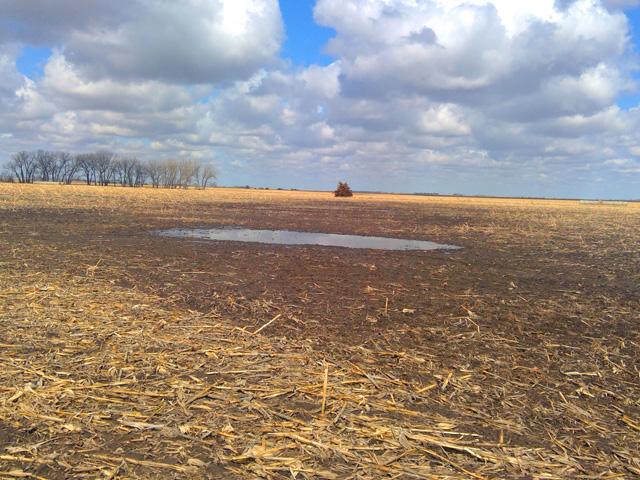USDA Wants Court to End Wetlands Case
USDA Tells Court It Plans to File Motion to Dismiss Wetlands Case by South Dakota Farmer
LINCOLN, Neb. (DTN) -- Attorneys for USDA are expected to file a motion to dismiss a wetlands lawsuit brought by Minor County, South Dakota, farmer Arlen Foster, according to a discovery document filed in federal court. A USDA motion to dismiss the case is expected to be filed by Nov. 8.
Back in May, Foster filed a lawsuit in the U.S. District Court for the District of South Dakota. The lawsuit alleges the agency unlawfully refused to reconsider a wetlands determination when Foster presented new evidence in 2020 that may have proven the land in question was not a wetland. USDA has maintained that a puddle in the middle of one of his fields is a wetland.
USDA attorneys said in a recent court filing Foster had not pursued all administrative remedies prior to filing the lawsuit.
"Plaintiffs have failed to exhaust their administrative remedies in obtaining a final agency decision regarding the NRCS response challenged in count four," USDA said in a court document.
"Defendants anticipate moving to dismiss plaintiffs' claims on various jurisdictional and other threshold grounds, including failure to exhaust administrative remedies and the lack of reviewable 'final agency action' under the Administrative Procedure Act, as well as moving on the merits, as each of the claims presented in this action fail as a matter of law."
Foster has been battling USDA's wetland determination on an 0.8-acre tract of land since 2008. USDA declared it a wetland in 2011 based on an agency process, and Foster convinced even the Supreme Court to review the determination.
New evidence emerged in 2020 showing a tree belt installed on his farm by his father in 1936 is what has caused massive snow piles in the field. The yearly spring melt has created a perpetual puddle.
Foster presented the evidence to USDA in April 2020, but the agency declined to update its 2011 determination, which hasn't allowed him to farm the ground.
Attorneys for Foster said in court documents the agency "unlawfully withheld agency action" by not considering the new evidence.
"Claims alleging that an agency is unlawfully withholding action are not subject to exhaustion requirements," Foster's attorneys said in a discovery document.
P[L1] D[0x0] M[300x250] OOP[F] ADUNIT[] T[]
"In any event, there is a final decision this court can review. It is the NRCS that makes the final decision whether or not to accept a request to review a previous wetlands delineation. That the NRCS makes the final decision to not review a request is reflected in the NRCS's August 2017 and May 2020 letters to the plaintiffs, which do not provide any appeal rights of the NRCS's determination."
Because of the determination that field is a wetland, Foster would not be eligible for farm programs if he farmed the land.
The Pacific Legal Foundation is representing Foster in his new lawsuit. The foundation takes on cases that have the potential to set precedent in the Supreme Court.
MUD PUDDLE
According to the lawsuit, Foster's mud puddle does not dry out at the same pace as surrounding fields because it receives additional snow melt from the tree belt.
In about half of those years, the mud puddle dries out soon enough that its soil also is dry enough to support the use of farm equipment.
Foster's technical report to USDA in 2020 as part of a requested review of the 2011 certification demonstrates the mud puddle was created "incidentally to the development of the tree belt and is therefore an 'artificial wetland,'" the lawsuit said.
That information was not available to the Fosters or USDA ahead of the 2011 wetland certification.
SWAMPBUSTER CHALLENGE
The lawsuit alleges the Swampbuster Act is unconstitutional because it "regulates every wetland in the United States of America, however small, however ephemeral, and however distant or unconnected from any other water body, so long as it is on a farm.
In June 2019, the Supreme Court ruled courts could no longer automatically defer to federal agency interpretation of federal rules.
The Supreme Court issued a ruling in Kisor v. Wilkie, a case involving Vietnam War veteran James L. Kisor and a government denial of benefits. That case challenged an administrative law doctrine that gives broad powers to federal agencies in how they interpret regulations. The doctrine is known as "Auer deference."
The legal doctrine allows courts to defer to agency interpretations of regulations in legal challenges as long as they are not inconsistent with regulatory text.
The Fosters' case was cited in the Kisor petition as an example of why the court should hear the case. Foster appealed a decision by the Natural Resources Conservation Service to use a comparison site to make a wetland determination on his land.
He previously argued unsuccessfully in court NRCS deprived him of his rights by deeming his land was similar to a known wetland 33 miles away.
In July 2008, Foster asked the NRCS to reconsider an earlier wetland delineation it performed, according to a petition he filed with the Supreme Court. Foster continued to challenge NRCS through a series of court cases, eventually losing in an appeal to the U.S. Court of Appeals for the Eighth Circuit in St. Louis in April 2016.
Read more on DTN:
"SD Farmer Sues USDA on Wetlands Battle," https://www.dtnpf.com/…
"Farmer Challenges USDA," https://www.dtnpf.com/…
Todd Neeley can be reached at todd.neeley@dtn.com
Follow him on Twitter @DTNeeley
(c) Copyright 2021 DTN, LLC. All rights reserved.




